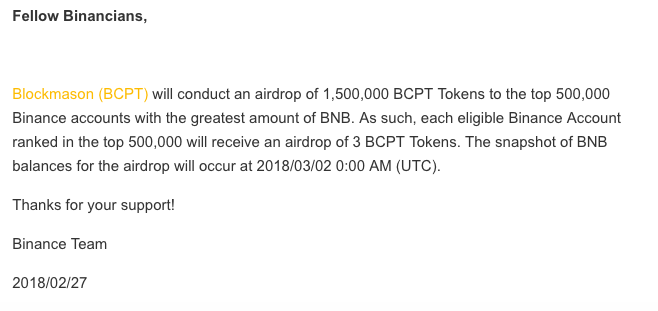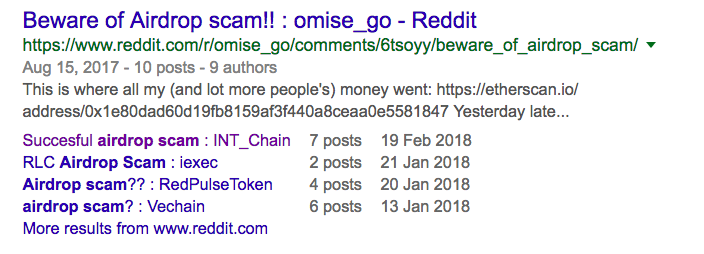Free money can’t just materialize out of nowhere, can it? Generally speaking, the answer is no. But in the wild and wonderful world of cryptocurrency, the old rules have been thrown out…and sometimes the answer to this question is: “Yes, it can.”
The free money we’re referring to is an “airdrop” of coins. You may have heard this term thrown around in various crypto circles and if you’ve never thoroughly understood it, this article is for you.
In the following, we’ll explain the how, what, and why of airdrops.
What is an Airdrop?
In the cryptocurrency space, the word airdrop has taken on a different meaning than the more commonly understood military definition. In crypto, the term airdrop refers to gifts or free money. Essentially, an airdrop is when a development team, company, or community distributes tokens to users free of charge.
Airdropping is a technique frequently used by startup businesses that are conducting an ICO to increase brand exposure and drum up excitement about their project. Airdrops are analogous to free samples at the mall (if those samples could appreciate in value). There are some other reasons for airdrops and we’ll discuss those in more detail below.
Some airdrops happen by surprise, and some are carefully orchestrated and well-communicated. Planned airdrops are announced in advance as part of a comprehensive marketing strategy that aims to build buzz. Surprise airdrops can generate a lot of publicity and achieve similar goals, but are a bit more of a gamble and tend to only make a splash if done by an already established cryptocurrency.
Why Do Airdrops Happen?
From creating hype around a new blockchain-based enterprise to rewarding loyal customers, there are a number of reasons why airdrops are carried out.
To reward users: Free tokens are sometimes provided as a reward to users of a service, giving them free tokens as a “thanks” for showing loyalty. Binance (a well-known cryptocurrency exchange) is one example of a company that did this.

To serve a practical transfer function: Airdrops can happen when there is a fork in a cryptocurrency or a new network is launched. Examples of this include Bitcoin users getting Bitcoin Cash, and Ethereum users getting Ethereum Classic tokens equal to the value of that held in their original wallets. Further examples include ETC holders being gifted CLO with the advent of the Callisto blockchain or NXT holders receiving IGNIS tokens following the IGNIS token sale.
To aid decentralization: Airdrops can help create a higher level of security for a network and its users. OmiseGO did an airdrop for this reason, distributing a sizable chunk of its tokens to Ethereum users. According to an official blog post:
We believe that introducing to a few hundred thousand account holders the possibility of being PoS validators will ultimately make the network stronger, and we hope it will create interest in OmiseGO and its underlying mechanisms.
To increase marketing efforts: As mentioned above, dev teams or companies decide to airdrop tokens to attract attention during their ICOs in order to encourage investment in their token. They’re also often used at the launch of a new currency to sweeten the deal, get people excited, and bring users in the door. As Facebook recently introduced a new advertising policy explicitly banning ICOs, many have turned to airdrops as an alternative method for PPC advertising.
How to Find Airdrop Information
Information about airdrops can be found pretty much anywhere you follow or discuss crypto.
Places like:
- Slack, Discord or Telegram channels
- Reddit or Bitcointalk
- Facebook groups
There are also quite a few sites that have been built expressly for the purpose of alerting people to the advent of an airdrop. A few notable ones are:
You can also find numerous social accounts dedicated to notifying people. Here is one such example. Sometimes you can also get it right from the source with an airdropping company announcing it on social media or via press release, like this one on Ethereum World News.
How To Claim an Airdrop
Poke around Reddit a bit and it will quickly become clear that there is often mass confusion on how exactly to claim airdropped coins. Let’s try to simplify.
In many cases, an airdropped coin is based on the Ethereum ERC-20 protocol and require an ERC-20 compliant, non-exchange wallet to claim. MetaMask or MyEtherWallet are two of the most popular solutions people use for this, and it’s important to note that the wallet must be active. Most airdrops have checks in place to make ensure that people aren’t just randomly generating a bunch of addresses and signing them all up to unfairly obtain a glut of coins.
In some scenarios, the coins will automatically hit your wallet and all you have do is wait. In other cases, you need to take specific actions or hold a certain token to qualify.
Usually what you need to do will be clearly communicated prior to the airdrop (the whole point is to give coins away, after all). You may also be required to follow on Twitter or join a Telegram group. Be sure that you do these things and don’t unfollow or leave before the airdrop, otherwise you may miss out.
A Quick Word on Security
The crypto space is unfortunately rife with scams and bad actors trying to take advantage of people. Remember this, and know that airdrops are no different.

With so many free tokens up for grabs, it can be easy to go on a clicking frenzy and get yourself into trouble. Your best defense is keeping your awareness close at hand and to verify everything. That aside, here are a few other reminders:
- Protect your private keys. Don’t believe anyone who claims to need them to check your wallet balance. This can easily be accomplished through Etherscan.
- Don’t send money to anyone. Remember, in an airdrop, you should be the beneficiary, so don’t send anything to someone else no matter the pretense. If an airdrop is asking you to send something, walk the other way immediately.
- Cross-check official sources. If a coin is conducting an airdrop, odds are it will be discussed publicly. Check official accounts to make sure that the airdrop is legit; otherwise, you might be subject to a scam with shady characters trying to collect your data.
Final Thoughts
Airdrops are undoubtedly useful techniques for raising awareness of a new token and to incentivize loyalty among new users. They’re great tools for promoters and developers of a new project to gain some recognition; and as a whole, they’ve benefited the market by getting more people interested in and vested in a wider range of cryptocurrencies.
Airdrops provide people with a proposition that is often too good to pass up—a chance to get a stake in something without any risk. From an investor’s point of view, airdrops are exciting. Just be sure to always confirm the authenticity of an airdrop campaign before participating in it.
In the US, airdropping has raised questions about taxes and whether they amount to income or capital gains. There does not appear to be a consensus answer on this yet, but consulting a qualified tax professional should be step one. Bitcoin.tax is a good resource as well.
Related: Essential Cryptocurrency Terms: A Beginner’s Guide

